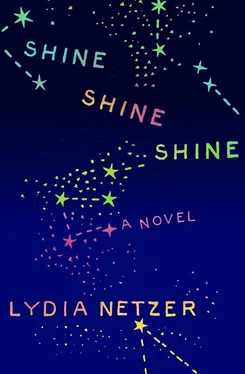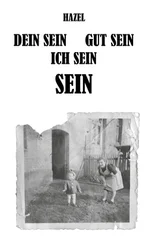At the bottom of the hill, she opened the door and began to run, leaving the car open behind her. Her long skirt beat against her legs and her feet kicked up gravel behind her. Her mind demanded she stay alive. She took a shuddering gasp and let it out, shifting the blankets just a little. She felt the crushing weight of her own ribs, felt that no more breath would come in. Maybe that was her last breath. Maybe it was over. She was done. But it couldn’t be. She had to run, she had to find out. So she dragged another breath in, her pulse jumping up in her neck, one gulping swallow of air as her throat collapsed, enough to keep her alive until she could see her child safe, until she could see Sunny and tell her “Don’t jump off that fucking bridge.”
Her legs carried her like the wind, over the gravel road and then onto the railroad ties, leaping from plank to plank between the place where the rails used to be. She felt no pain, she felt only suffocation. She felt her blood, incapable of doing its job. She felt her mind shutting her off. Don’t tell the feet, she thought. Let them keep running. At last she turned the corner and saw the bridge, its dark brown trapezoids rising against that bright blue sky.
“Sunny,” she tried to cry, but there was no air. Her lungs were finished. They could not do it, not even one more time. Her chest contracted. Her cells struggled. She hung on the nearest beam, clung to it, thrusting her head out over the water, straining to see. There were the kids. Was Sunny alone? No, Maxon was already in the water. Bastard. He had probably worked out all the angles and trajectories. He had probably told her just the right way to jump. It wasn’t fair. She had probably demanded it. She would, she was always trying to be like the other children. How much this would mean to her, poor bald Sunny, with her awful baldness, to jump off the Belmar bridge just like the other kids did, to talk about it later, over sodas at the Jolly Milk, sitting on the roof of someone’s car, a gang of kids, a group of friends, and Maxon hanging back, driving for her, working out the math for her, silent when she told him to be silent, letting her kill herself to fit in.
Sunny was there, poised. The mother tried to gasp out a warning, gasp out a final endearment. Sunny, I love you. But there was no air, and there was no blood, and the blackness came down from on top of her head and shut her down. In the reverie, she hung there, her body limp and crumpled against a beam. In reality, she died there, in the hospital bed, and went into the dark. Her brain stopped working and that was it, just at the wrong moment. One minute there were electrochemical processes inside the skull. The next minute there were not. No one shared it, no one eased it to its end, and no one could have prevented it. It just happened. A death happened at 3:12 in the morning. A private death between the mother and herself, before she could finish her one last dream. This is what it means to die: You do not finish.
* * *
THE ROAD TO LANGLEY Research Center leads back through the swampy area of Virginia’s Eastern Shore. In the middle of the night, it is a dark and quiet place. Ditches on each side of the road drain the water, and herons stand, their heads tucked into their wings. It’s like a seedier, smaller version of the road to the Kennedy Space Center, over miles of swampy Florida coastal marsh. There you can see rows of palm trees swaying in the wind, in the morning, on the day of a bright and optimistic launch. Here she saw kudzu in the headlights, mile markers, and she could barely remember where to turn.
At 3:30 a.m. Sunny showed her ID at the gate. Off to the right was the hangar, huge and white, full of rocket parts, airplanes, and all kinds of apparatuses. Behind her was the wind tunnel. The base was like a college campus, but instead of stacked rectangles for office buildings and classrooms, the architecture was all outsized and strange, not built for human habitation, but for the convenience of science. This facility, like its geographical context, was a dingy, underfunded sister of the Kennedy Space Center. But he worked here because he didn’t want to move to Florida. And ultimately, it didn’t matter. He had his trade right between his ears. There were labs, and there were lab workers everywhere.
She drove past the huge round buildings they jokingly called the brain tanks, and past the new accelerator. She drove past the building where Maxon had his materials tested, full of giant machines whose only job is to break things to make sure they’re strong. Many of the buildings at Langley were shoddy and brown, built in the seventies and never refurbished. It was always a surprise to step into the buildings and find everything so high-tech.
Sunny parked, gently eased Bubber out of the backseat. He cried a little bit, and blinked, and then, standing in the car still, said, “Where are we?”
“What a great question,” said Sunny. “We are at Daddy’s work. We are going to talk to Daddy.”
“Daddy is on the moon. The moon has a lava pipe. That’s where Daddy’s going to put the robot. The lava pipe.”
“Right,” said Sunny. “Should I carry you, or can you walk?”
Please say walk, she thought. She hadn’t had any contractions since she woke up, but she was nervous about it.
“Walk,” said Bubber.
“That’s a good baby,” said Sunny. She kissed him and kissed him all over his face. He resisted her, as stony as if she had been kissing the back of the seat.
“I don’t care if you don’t want to be kissed and hugged, Bubber,” she said as she took his hand. “I’m going to kiss and hug you anyway.”
“Fine,” said Bubber.
“Let’s go.”
Stanovich met her at the door. The lobby of Maxon’s building was dimly lit.
“The gate guard called and said you were here,” he said. “Come on, right this way.”
He took her by the arm, and she took Bubber by his arm. They went to a part of the building she had never seen before. He pushed open several sets of brown metal doors and led her up a stairwell. The concrete on the stairs was chipped, the window dusty. Sunny stopped on the landing, waved for Stanovich to give her a second.
“I’m a little pregnant, Stan,” she said. “I can’t go galloping up stairs anymore.”
“Ah, right,” he said. He stood nervously, knocking the railing with his knuckle. Stanovich was a gray-haired man, but smooth and spry, maybe old enough to be Sunny’s father, or maybe forty. He had a thick mustache and thicker glasses, sunken eyes and bushy eyebrows, big ears. He always wore short-sleeved shirts with collars, black or navy pants. He was old-school NASA, and a professional. Maxon had a lot of respect for him, so Sunny did, too. And she liked him. He had a wife and kids in Newport News.
“Okay, I think I’ve caught my breath,” said Sunny. Catching sight of herself in a windowpane, she realized that Stan had not commented on her hair, or lack of it. She wondered if he was just that distracted, or if Maxon had told him. Maybe some late night, bent over difficult problem, or pacing back and forth in front of a whiteboard full of formulas, he’d spilled the beans. Hey, my wife is bald , he might have said, but let’s get back to this robot.
“Bubber, you all right?” Stan said, poised to continue up the stairs.
Bubber, staring at the concrete blocks in the walls, gave him a thumbs-up. Stan leaped up the next flight and pushed open another metal door.
“This is my domain,” said Stanovich. “Welcome. Sorry not under better circumstances.”
“But these are great circumstances, right?” said Sunny. “They’re alive, they’re talking. They’ll make it.”
Stan was silent, moving down the gray hallway more slowly now.
Читать дальше









